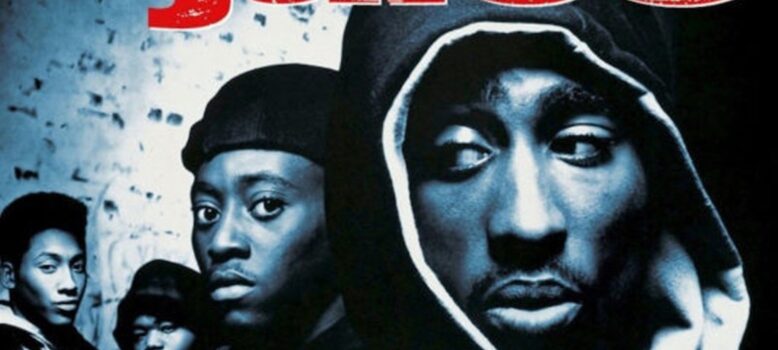
HIP HOP at 50: How the movie Juice prophesized Tupac Shakur’s life, and death

I can still feel the anxiety from skipping school that day. It wasn’t to hang out with a girl, or get high (although we did that too). For my friends and I, all we cared about was seeing this movie.
That movie was Juice.
On this day in 1991 2Pac began shooting "Juice" in Harlem, New York.
What did you think of this behind the scenes footage Tupac fans? pic.twitter.com/F2M6hCKryB
— 2pacunlimited.eth 𓃮 (@2pacunlimited) March 26, 2023
Let me tell you something; if you were one of very few hip hop heads living in a white Toronto suburb in 1992, you goddam well skipped school to go see Juice. In 1992, Tupac Shakur had only put out one album, 2Pacalypse Now, before playing the role of Roland Bishop, a kid from Harlem with a broken father who was seduced by street life and the pursuit of a rep.
The film opens with Bishop and his friends – Quincy Q Powell (Omar Epps), Raheem Porter (Khalil Kain), and Eric ‘Steel’ Thurman – skipping school, running from truancy officers, dodging a Puerto Rican street gang, shoplifting vinyl, drinking 40 ouncers, and hitting the arcade. Despite being white kids from Whitby, Ontario, it was remarkably easy to relate to these characters. Other than the Puerto Rican street gang, it was like watching out own lives on film.
“Him being a rapper would've been too easy. Being a DJ made Q more of a kid who probably could have been playing tenor sax or trumpet. Since he didn’t have that, he used turntables…"
"Juice At 30: A Psychological Thriller Dressed in 'Hood Movie' Clothes"https://t.co/mTsmxdLb2g pic.twitter.com/LVCamt7W8F— Rock The Bells (@RockTheBells) January 17, 2022
The music was the anchor for Epps’ character, Q, and through him our ability to relate to being a kid who may have gotten into some trouble, but whose soul was ultimately moved by DJing rather than street bravado.
By the second act my ability to relate was replaced by the realization that I had no idea what it was like to live in that kind of environment, from that community, dealing with those set of circumstances.
To this day I am grateful that I was drawn towards hip hop rather than rock or grunge or electronic music. Juice, for better or worse, was easier for me to relate to than, say, Dazed and Confused or some other film with a soundtrack that didn’t feature Eric B. and Rakim, Naughty By Nature, Big Daddy Kane, EPMD, Too Short, Cypress Hill and Salt-n-Peppa.
Half of y’all gotta be bots😭😭
Dezz saying “If Raheem dead then somebody shot him” is not TOS it’s from the movie Juice😭💀 pic.twitter.com/0k6sxQNRN3— Kai Mafia Updates🗽💫 (@Kaimafiaupdates) February 12, 2023
Hip hop films from the 90s might as well be its own genre. This was the Golden Era of hip hop, when classics were being made in real time, and when the culture was cementing itself as the most influential among young people. So, the real time depiction of teenagers living inside the culture was something I was enamored with.
Half of y’all gotta be bots😭😭
Dezz saying “If Raheem dead then somebody shot him” is not TOS it’s from the movie Juice😭💀 pic.twitter.com/0k6sxQNRN3— Kai Mafia Updates🗽💫 (@Kaimafiaupdates) February 12, 2023
Whitby wasn’t exactly Harlem, but that was part of the seduction of hip hop culture. The music got me hooked, and so a fascination with black America was the way many of us rebelled. Sometimes white kids adopted the culture in a way that today might come off as appropriation, but as one black woman recently said to me, “you didn’t choose hip hop, hip hop chose you.”
She’s right.
Still, even my rebellious ass never fucked with guns as a teenager. A few years earlier, after watching Do The Right Thing for the first time, I rapidly became aware of racial politics in America. I remember intently listening to emcees as they retold snapshots of their lives. It all centered around survival. Rappers told stories of poverty, drugs, broken homes and gun violence. That’s why, especially in hindsight, Shakur’s character being put under a spell by a handgun is so powerful. In Juice, the gun is more like another character than a weapon; the gun is the source of the energy that makes young men feel invincible. Ironically, Shakur’s own life would be decided by the same source just 4 short years later.
The four friends decide to rob the neighbourhood convenience store. This quick-cash scheme was out of character for Q, Steel, and Rahim, but Bishop was empowered by pointing the gun at the store owner. Despite securing the cash from the register clear and free, Bishop shot the store owner in the head. Moments later, after fleeing to an abandoned building, Bishop killed Rahim, and appeared to be a sociopath in-the-making. To quote the late rapper G.U.R.U. of Gangstarr, it was nothin’…he did it just to get a rep.
On this day in 1992, the movie ‘Juice’ is released in theaters. Here’s a rare clip of 2Pac explaining the plot #RIP2Pac pic.twitter.com/psvJEGlj2a
— 97.9 The Box (@979TheBox) January 17, 2021
That willingness to take a life is something not many of us have. And for all the boilerplate talking points by pro-gun enthusiasts, nobody ever talks about the psychology awakened in some when they hold a gun in their hand. Bishop trades all of his friends for the feeling of not being afraid, the gun providing more than just bullets and fear. For Bishop, the gun became his identity.
And then finally, it became his downfall.
Juice is a classic film in my circles, and yet the timelessness of gun culture means it is still relevant today. At the time of this writing, the bodies of the kids killed in a school shooting in Tennessee are barely cold. Guns have never been more popular, and Tupac’s death is the first flank of a distinctly American disease that won’t see the bookend if something doesn’t drastically change.
Juice is both nostalgia and present-day, and hip hop’s 50th birthday wouldn’t be complete without giving it its due as one of the greatest films to emerge from its most important era.









